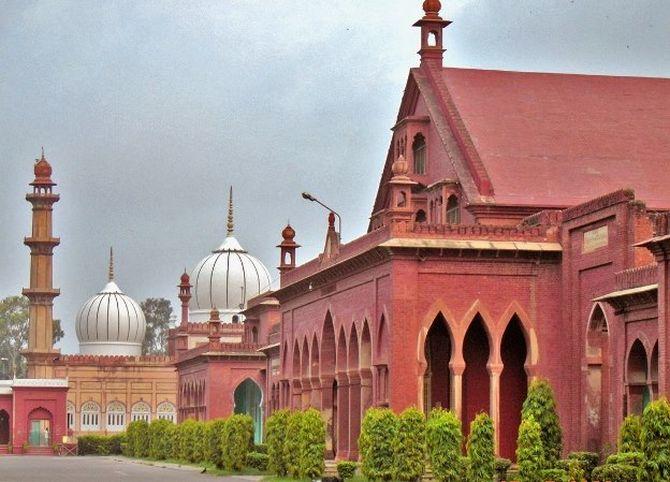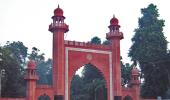There is nothing "fundamentally inconsistent" with a minority institution being an institution of national importance (INI), the Supreme Court said on Wednesday while hearing arguments on the vexed issue of minority status to Aligarh Muslim University (AMU).

The observation from the apex court assumes significance as the Centre, in its written submission filed in the top court, has said that AMU is an institution of a "national character" and it cannot be considered as a minority institution irrespective of the question whether it was established and administered by the minority at the time of inception or not.
Article 30 of the Constitution deals with the right of minorities to establish and administer educational institutions.
"There is nothing fundamentally inconsistent with a minority institution being an institution of national importance. That also we have to understand," said Chief Justice D Y Chandrachud, who is heading a seven-judge Constitution bench that is hearing the matter.
The bench, also comprising justices Sanjiv Khanna, Surya Kant, J B Pardiwala, Dipankar Datta, Manoj Misra and Satish Chandra Sharma, heard submissions on several aspects, including on the AMU (Amendment) Act of 1981.
A five-judge Constitution bench had in the S Azeez Basha versus Union of India case in 1967 held that since AMU was a central university, it cannot be considered a minority institution.
However, it got back its minority status when Parliament passed the AMU (Amendment) Act in 1981.
Later, in January 2006, the Allahabad high court struck down the provision of the AMU (Amendment) Act, 1981 by which the varsity was accorded minority status.
During the seventh day of the hearing on Wednesday, senior advocate N K Kaul, arguing for one of the parties opposing the minority status to AMU, told the bench that the 1981 amendment does not remove the basis of the Basha verdict.
"By deletion of the word 'establish' and amending the definition of university, you can't remove the basis of Basha which recognises the historical fact," he argued.
Kaul said a change in legislative history was not possible in the manner the 1981 Act was seeking to do.
He said a historical fact can't be revised or altered either by a legal fiction or a parliamentary fiat.
"Mr Kaul, you are also appearing on the side of the government. In the eagerness to uphold the striking down of the 1981 amendment, let us not do something which substantially cripples the powers of Parliament.
"We should be very averse to take that kind of an interpretation," the CJI said.
"So, in the effort to sustain the decision of the Allahabad High Court and to get over the 1981 amendment, we should not be doing something, we means you, which really in that sense will substantially mute the powers of the parliament for future," Justice Chandrachud said.
He said the court would have to be very careful because what it would be laying down would be a law for the future.
Justice Khanna observed that it is well-settled that the legislature can make laws with retrospective effect.
Kaul said there were actions of Parliament as well that were struck down and held to be ultra vires.
The bench said Parliament can make that distinction between incorporation and setting up.
"So, let us not sort of go into a wider context and sort of dilute the powers of parliament by laying such a broad proposition that it is not open to parliament while legislating to take a view of historical facts to the contrary even if it is embodied in a judgement of the court," the CJI observed.
When Kaul said the 1981 amendment does not remove the basis of Basha, Justice Chandrachud said, "In analysing this aspect, we would like you to deal separately on the establishment aspect of Basha and the administration aspect of Basha."
During the hearing, the bench heard submissions of lawyers, including Kaul, senior advocate S Guru Krishna Kumar, Additional Solicitor General Vikramjit Banerjee and others.
The bench also heard submissions of senior advocate Rajeev Dhavan, who is appearing for AMU.
The arguments remained inconclusive and would continue on Thursday.
During the arguments on Tuesday, Solicitor General Tushar Mehta, appearing for the Centre, had said an institution of national importance must reflect the "national structure".
The top court had on February 12, 2019, referred to a seven-judge bench the contentious issue for adjudication. A similar reference was made earlier.
The Congress-led UPA government at the Centre moved an appeal against the 2006 high court order. The university also filed a separate petition against it.
The NDA government spearheaded by the BJP told the apex court in 2016 that it would withdraw the appeal filed by the erstwhile UPA dispensation.
It had cited the apex court's 1967 judgment in the Basha case to claim that AMU was not a minority institution since it was a central university funded by the government.










